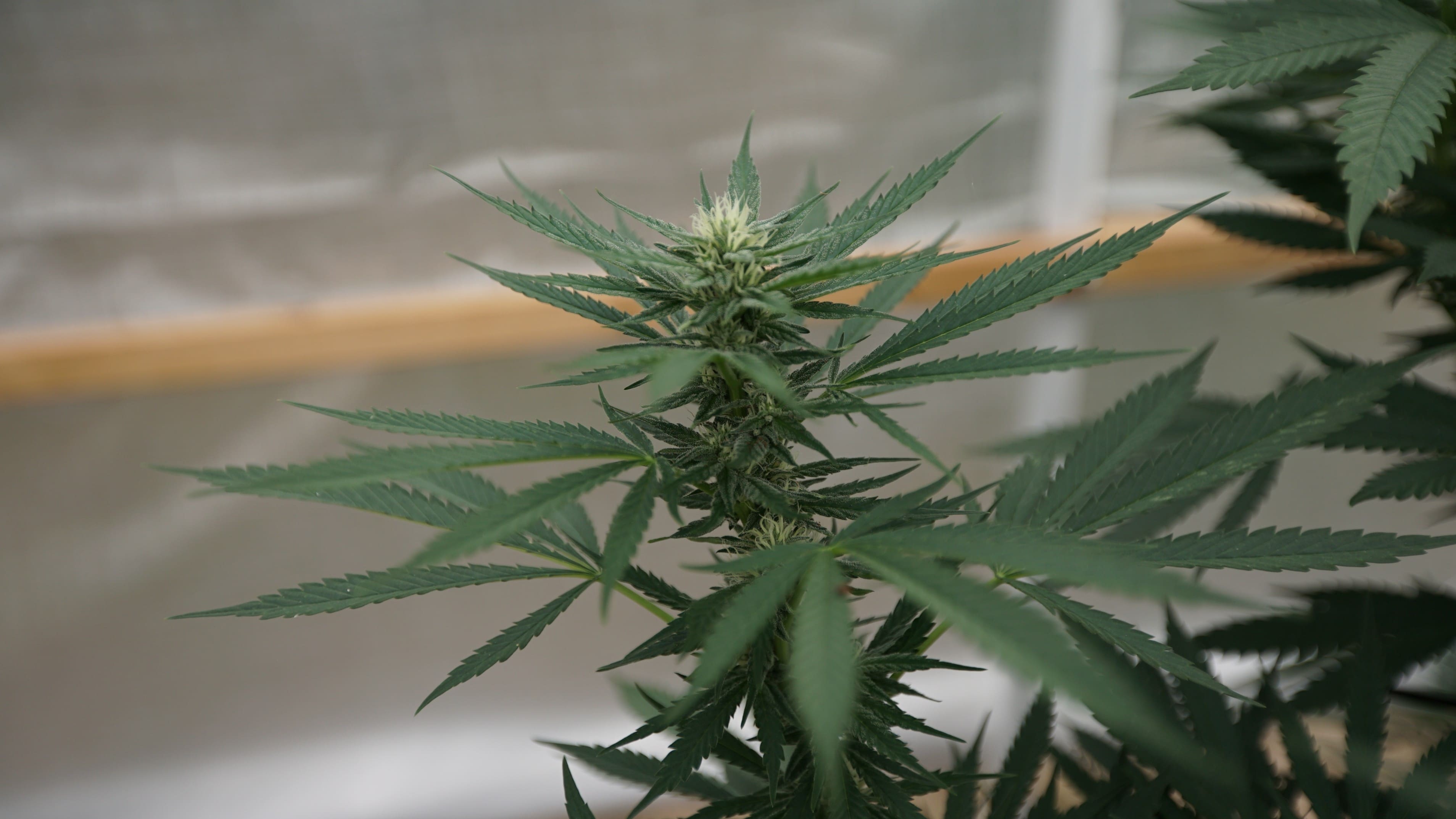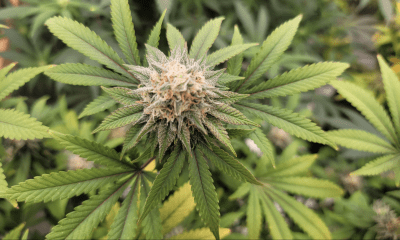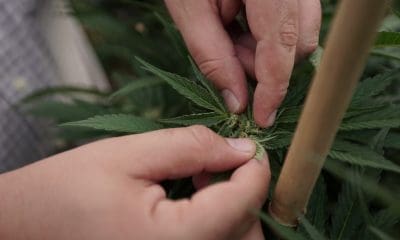Politics
New Hampshire House Approves State-Run Marijuana Legalization Bill And Rejects Psilocybin Decriminalization Measure

The New Hampshire House on Thursday approved a bill to legalize marijuana through a state-run model—but the chamber tabled a separate bill that would have decriminalized possession of psilocybin mushrooms.
This is the second time that the House has taken up the state-run cannabis legalization bill, HB 1598, sponsored by Rep. Darryl Abbas (R).
It passed on the floor last month, but needed to go back to the Ways & Means Committee because it involved economic components. That panel met several times and made amendments, sending it back to the floor, where the full body passed it again in a 169-156 vote. It now heads to the Senate.
“The primary objective of this bill is the policy of legalization of cannabis for both possession and personal use and was passed by the House earlier this session,” Rep. Timothy Lang (R) said in a statement included in the House calendar. “This bill accomplishes that primary objective, so New Hampshire will no longer arrest and prosecute New Hampshire citizens for possession of personal use quantities of cannabis.”
Speaking for the committee minority, Rep. Richard Ames (D) said that its members agree “that the ongoing prohibition of a commercial system for recreational cannabis within New Hampshire has not and does not work and that this prohibition continues to foster an illegal and harmful black market.”
However, “the minority believes that there are too many unanswered revenue and spending uncertainties in this bill to warrant its approval at this time.”
While advocates have spent years pushing for an end to cannabis criminalization and a regulated market for adult consumers, the idea of a first-in-the-nation, government-run cannabis market has left many stakeholders with reservations.
In committee, members approved an amendment from Lang that removed a proposed 15-license cap for privately owned cultivation businesses that would supply the state-run stores with product.
Some advocates and stakeholders appreciated that revision, but representatives of New Hampshire’s current medical cannabis industry still feel that lawmakers are advancing legislation that would dramatically impact their viability in the market.
—
Marijuana Moment is already tracking more than 1,000 cannabis, psychedelics and drug policy bills in state legislatures and Congress this year. Patreon supporters pledging at least $25/month get access to our interactive maps, charts and hearing calendar so they don’t miss any developments.
![]()
Learn more about our marijuana bill tracker and become a supporter on Patreon to get access.
—
The bill as passed prevents adult-use consumers from buying “infused” cannabis products like edibles, which some advocates view as unnecessarily restrictive, especially considering that medical cannabis patients are permitted to purchase edibles at the limited number of operating dispensaries in the state.
But because the legislation also scraps existing state statute decriminalizing cannabis, the prohibition on edibles created a “legal limbo” where adults could be potentially criminalized for possessing such products, a member said on the floor. His amendment to ensure that non-patients who possess edibles aren’t criminalized was adopted.
Notably, the legislation earned some praise from Gov. Chris Sununu (R), who despite being a historically outspoken opponent of adult-use legalization, said this month that reform “could be inevitable” in the state and that HB 1598 is “the right bill and the right structure.”
“So if you are ever going to do it, do that bill,” he said.
The governor added in a separate recent interview that he’s “not fully committal” in his longstanding opposition to legalization.
Despite the unexpected quasi-endorsement from the governor, however, both the Senate majority leader and minority leader recently said they don’t think now is the time to legalize—raising serious questions about the legislation’s path to Sununu’s desk despite the House action on Thursday.
The bill outlines a model where all cannabis dispensaries in New Hampshire would be operated by the state under the State Liquor Commission. It currently proposes a cap on the number of grow licenses, and it does not include home grow provisions. Adults could possess up to four ounces of cannabis under the law.
Rep. Daryl Abbas (R-Salem) released the following statement after the New Hampshire House passed HB1598, legalizing the possession and use of cannabis, on a vote of 169-156. #NHPolitics pic.twitter.com/HPjU4CSFMh
— NH House Republicans (@NHHouseGOP) March 31, 2022
State regulators would have until October 1 to adopt rules for “the registration and regulation of cannabis establishments and cannabis cultivation facilities.” They would then have another two months to create regulations on issues like advertising, labeling, civil fines, security and THC limits.
An amendment that concerns setting aside certain tax revenue from marijuana sales for the state’s education fund was adopted on the floor by voice vote. The body also passed a proposed revision to require adult-use cannabis retailers to display public health materials, as is mandated for existing medical cannabis dispensaries.
Advocates for cannabis legalization in the state have been vocal about their concerns with the legislation, saying both the state-run model and imposing a limit on cultivator licenses as proposed in the bill would prevent New Hampshire from reaping the full benefits of legalization in their state. And specifically, some worry that the proposal would effectively kneecap the existing medical cannabis market.
A lawmaker attempted to significantly alter the bill by having private businesses sell marijuana, rather than state-run operators. But that was defeated. A motion to table the legislation was also rejected.
There is no cap to the number of dispensaries in the current bill, but the plan is to open ten state-run stores within the first three years.
Advocates and stakeholders have spent years working with the GOP-controlled legislature to craft thoughtful legislation to end cannabis criminalization, though diverging viewpoints and resistance from Republican leadership has consistently derailed the reform.
The House on Thursday also rejected an amendment to an unrelated education bill, HB 1627, that would have attached language simply legalizing the personal possession and cultivation of cannabis for adults. It was defeated largely on procedural grounds.
A separate, non-commercial legalization bill passed the House in January. The bill as introduced is nearly identical to an earlier version that also passed the House under Democratic control in 2020. The previous bill died in Senate committee.
To advocates, the House vote to pass Rep. Carol McGuire’s (R) home grow bill in January felt like a step in the right direction. Still, many felt stung by the fact that the chamber elected to advance that bill a day after narrowly rejecting a preferred, regulated sales model as prescribed in HB 237.
Meanwhile, three lawmakers—Reps. Joshua Adjutant (D), Renny Cushing (D) and Andrew Prout (R)—each filed separate bills to put marijuana legalization on the state’s 2022 ballot. Cushing, who served as House Democratic leader, passed away this month after a battle with cancer.
The House defeated Prout’s proposed constitutional amendment this month and voted to table the two other measures.
In order to have advanced any of the proposed constitutional amendments, it would have taken a supermajority 60 percent vote in both chambers. If any of the constitutional amendments were enacted, it would have enabled legislators to avoid a likely veto on statutory reform legislation from anti-legalization Sununu.
If legislators had ultimately moved to place a constitutional amendment to legalize cannabis on the ballot, 67 percent of voters would then have needed to vote in favor for it to be enacted. Recent polling indicates that residents are ready for the reform, with three in four New Hampshirites favoring legalization.
The governor’s opposition to adult-use legalization has been a constant source of contention. However, advocates were glad that he at least signed a bill in August adding opioid use disorder as a qualifying condition for the state’s medical cannabis program and also allows out-of-state patients to access dispensaries.
In 2017, Sununu signed a bill decriminalizing marijuana possession in the Granite State, though he continues to oppose adding a legal commercial cannabis sales component.
In 2019, lawmakers sent a medical cannabis home grow bill to Sununu’s desk, but he vetoed it.
Meanwhile, other nearby northeast states such as Maine and Vermont have already legalized recreational cannabis.
Photo courtesy of Chris Wallis // Side Pocket Images.
















